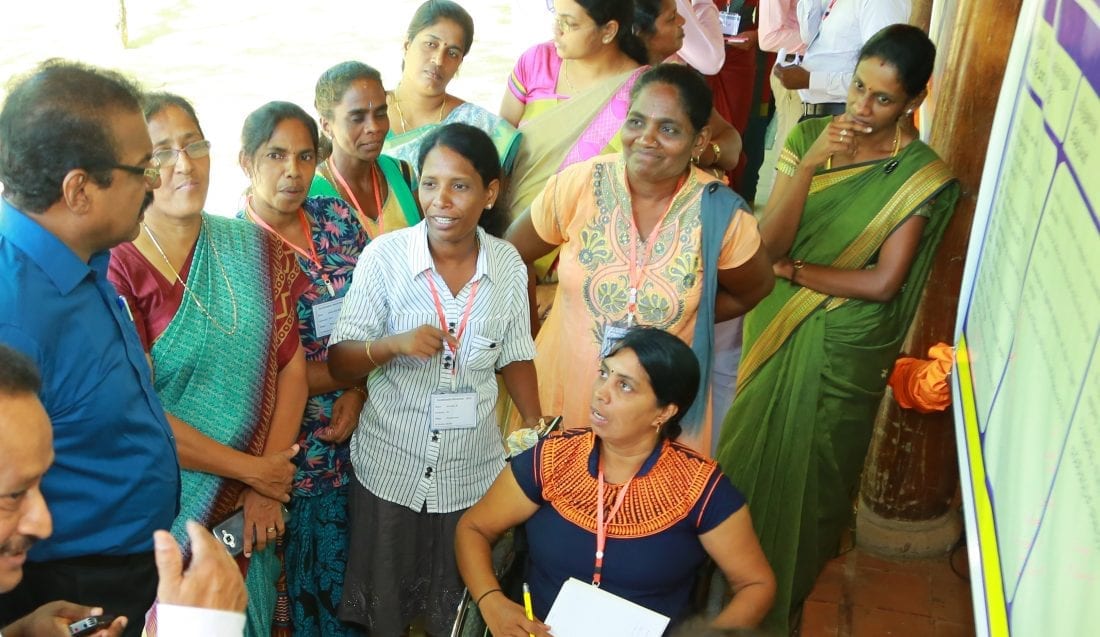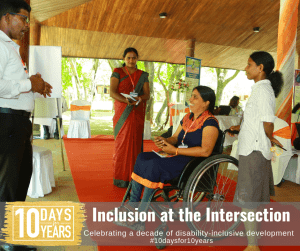Inclusion at the Intersection: Addressing gender and disability in Australian aid
In every country with available data, more women than men are recorded to be living with a disability.[1] On a global scale, it is estimated that 19 per cent of women have a disability, compared to 12 per cent of men.[2]
The challenges are more complex than increased disability prevalence: women and girls with disabilities experience unique barriers to accessing suitable treatment and rehabilitation services; are consistently recorded as reaching lower levels of educational attainment and employment; and are at higher risk of abuse and violence not only in the home, but in institutions, health centres, schools and other public and private facilities.[3]
Despite these experiences arising from the intersections of gender- and disability-based discrimination, women and girls with disabilities have had to fight for equal representation in both the gender equality and disability rights movements.
Both DFAT’s original and subsequent Development for All strategies have placed the experiences of women and girls at the forefront. The 2009 strategy embedded the recognition of the interaction of gender and disability as a guiding principle, and this was reaffirmed and expanded upon in the subsequent Development for All 2015-2020 strategy. Equally significantly, the 2016 Gender Equality and Women’s Empowerment Strategy also recognised that ‘women are not a homogeneous group’[4], and committed to prioritising engagement with women’s organisations that represented the most marginalised, including women and girls with disabilities.
These strategies are more than words on the page. They drive investment in real programs, and yield real impact for women and girls.
With funding from the Department of Foreign Affairs and Trade’s Australian NGO Cooperation Program (ANCP), World Vision Australia is delivering a transformative gender- and disability-inclusive economic development project in north-eastern Sri Lanka, known as iLIVE. The project engages directly with the systemic exclusion of women and people with disabilities by identifying barriers to meaningful participation in economic activities, and addressing these through both disability- and women-specific interventions as well as mainstreaming approaches.
Affirming its commitment to empowering some of Sri Lanka’s most marginalised people, the project turns economic participation on its head: rather than identifying markets in which people with disabilities and women are typically involved, the iLIVE model prioritises value chain analysis which first seeks to understand the most profitable local opportunities. The project then works to dismantle barriers and foster inclusion in real, high-value income generation activities.
For women like Kosala, who uses a prosthetic leg and wheelchair, this approach has yielded outcomes beyond the economic. Having attended leadership training, started mushroom farming and become an active participant in a village savings group
‘…her experience has challenged the pervasive social norms that create attitudinal barriers for women with disabilities.’
through the iLIVE project, Kosala has now become treasurer of her local disabled people’s organisation (DPO) and was selected by the Government of Sri Lanka to participate in further, international training. Significantly, her experience has challenged the pervasive social norms that create attitudinal barriers for women with disabilities.
Such social norms are deeply embedded, and provide a foundation to heightened barriers to education and employment. They also underpin increased rates of violence: globally, women and girls with disabilities are two to three times more likely to experience violence than women and girls without disabilities.[5]
The intersectional principles of the Development for All strategies have driven efforts to better understand such violence. With funding from the Australian aid program, CBM Australia, the International Women’s Development Agency (IWDA), Monash University and local organisations partnered to conduct ground-breaking research into violence against women with disabilities in Cambodia. This research investigates the compounding factors of gender, disability and poverty, and gives the resulting discrimination a name: Triple Jeopardy.
The Triple Jeopardy report uncovers central truths about the lives of Cambodian women with disabilities, including that they experience similar levels of sexual, physical and emotional violence by partners compared to women without disabilities, but endure significantly higher levels of all forms of family violence. At the hands of family members, 52.5 per cent of women with disabilities reported emotional abuse, 25.4 per cent reported physical violence, and 5.7 per cent reported sexual violence.[6] At a systemic level, all also faced heightened barriers to seeking and accessing support.
Such research is necessary to ensure that development actors not only understand the ways in which discrimination is compounded by gender and disability norms, but the practical impacts.
Adaptation of the research into a community toolkit for change further ensures that this understanding is translated into action.
Women and girls with disabilities continue to face heightened barriers and underrepresentation at all levels, from family decision-making to the halls of governments and the UN. But irrefutable data, amplified lived experience, and targeted strategies for intersectional inclusion are supporting development actors to recognise and uphold the unique experiences and rights of women and girls with disabilities.

Caption: Kosala (center front) discussing economic development activities at the 2018 planning workshop in Batticaloa, Sri Lanka, with World Vision Lanka Project technical adviser. Copyright: World Vision Australia.
Information and photos used in partnership with World Vision Australia, CBM Australia and the International Women’s Development Agency.
References
[1] Mitra, S., Posarac, A. and Vick, B. 2011. Disability and Poverty in Developing Countries: A snapshot from the World Health Survey. SP Discussion Paper No. 1109, World Bank. p. 34.
[2] World Health Organisation and World Bank, 2011. World Report on Disability. p. 28.
[3] CBM Australia, 2018. Leave No One Behind: Gender equality, disability inclusion and leadership for sustainable development.
[4] Department of Foreign Affairs and Trade, 2016. Gender Equality and Women’s Empowerment Strategy. DFAT, Canberra. p. 25.
[5] UK Department for International Development, 2000. Disability, Poverty and Development. DFID, London. p. 3.
[6] Astbury, J. and Walji, F. 2013. Triple Jeopardy: Gender-based violence and human rights violations experienced by women with disabilities in Cambodia. AusAID, Canberra. p. 7-8.
Sign up to receive the daily campaign article:
By signing up you will receive a daily email from the 10 days for 10 years campaign between 29 April to 10 May 2019.
10 days for 10 years
In partnership with CBM Australia and other ADDC partner organisations, the 10 days for 10 years campaign runs from 29 April to 10 May 2019. The campaign is celebrating the achievements in disability-inclusive development (DID) within the Australian aid sector, particularly those led or made possible by Australian aid under the first and second Development for All strategies. Articles will be released daily here on the ADDC website.
Follow the campaign via the hashtag #10daysfor10years and follow @ADDCnews on Twitter, Facebook and LinkedIn.
- 10 days for 10 years
- Day 1 – A Legacy of Leadership
- Day 2 – Beyond the Mainstream
- Day 3 – Inclusion at the Intersection
- Day 4 – Disabled People’s Organisations Leading Change
- Day 5 – Recognising Diversity within Disability
- Day 6 – Reporting from the Shadows
- Day 7 – Volunteering for Inclusion
- Day 8 – Evolution of Inclusion
- Day 9 – Education for All
- Day 10 – Building on Success

